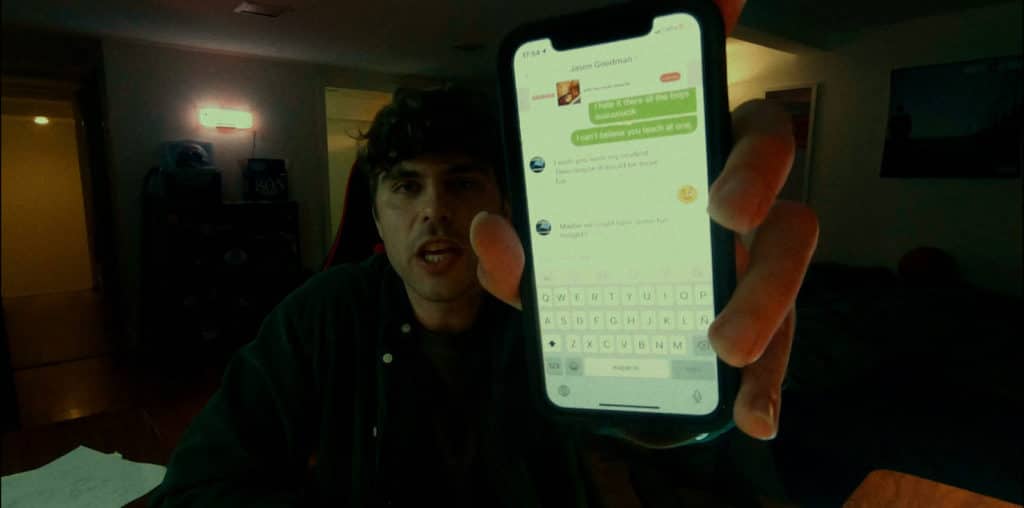
In the days of the YouTube famous, everyone wants a gimmick to get them noticed – even if it means an element of personal risk. It’s a way to get ahead, right? This phenomenon has steadily started to make its way into cinema, where looking at what people are prepared to do, and at what cost, is a source of modern fascination. Though of course, a lot of the things people do on their channels are themselves inspired by examples from film and TV, so art imitates life imitates art. Low Life (2022) is an ambitious spin on this, though the social media aspect of the film acts more as a framing narrative than as an integral plot device; really what this film does, and does well, is explore a series of unfortunate events.
Benny (Wes Dunlap) has a channel called Creep Dunk: it’s essentially his own DIY spin on To Catch a Predator – the TV series – only rendered down into abrasive snippets as per the expectations of an online audience. Creep Dunk is a source of exasperation for the local police, whose cases it keeps jeopardising. This doesn’t bother Benny; in fact, he sees the negative attention as a badge of approval, a sign of his growing notoriety, and so he keeps going. He masquerades as underage girls and hooks people in, although it can be an abortive process at times – as shown by an embarrassing early encounter. Still, he thinks he’s found a live one: a local teacher, who has been messaging what he seems to think is a Grade 7 girl, asking ‘her’ for explicit selfies. Benny takes a big risk, reaching out to this man and – out of desperation to get a big hitter, by any means – sharing his address, inviting this man to come over. This is all partly motivated by the attentions of a young fan, Nicole (Lucy Urbano) who found him this guy, a father of a friend. She also ends up involved in one way and another, and as she has aspirations to actually work with Creep Dunk, her awareness of the scheme adds another complicating factor. The stage is therefore set for a range of flimsy plans to collapse, though the extent of all of this – when it finally comes – is quite something.
The film moves quite quickly from being handheld, i.e. when Benny is actually recording for his channel, to a more conventional shooting style. This tells us that, really, it’s Benny’s story which is being told here, and the shift between a film made by him and about him helps the film’s overall readability, as well as getting rid of the issues around what would have been called ‘found footage’ once, but is now just filmed footage, shorn of a lot of the issues which were around before it was quite so easy to edit, adjust and present filmed material. There are some issues in the first thirty minutes or so of the film, however: a lot of the dialogue could be tighter, as it feels aimless; the poker game as a visual metaphor is rather laboured, and it’s really at this stage that the film risks becoming diffuse. Thankfully, the film begins to add in twists, starting more low key, but steadily escalating as errors, misunderstandings and shock developments occur.
A large share of this developing tension comes from a further exploration of Benny’s character, though it’s also at this point that some viewers may begin to struggle with the film, because: Benny is far from easy to watch. He’s clearly a liability, and assuming the film wants us to see that, then it succeeds. It’s just that not everyone may be up for that particular journey, as vital as it is to gleaning what is really going on and why. Make no mistake: Benny makes your nerves jangle. At first you can put that down to the ‘big voice’ of the small time vlogger, but nope, he’s like that all the time. He is an irate, frustrated and unstable young man, whose promising career as a basketball player disintegrated; this is something he clearly hates, as he continues to hover on the periphery of the sport, as if in a kind of arrested development. His channel and his attempts to ‘out’ these men speak to various needs, not least of which is as a way to lash out at a world which he feels pushed him aside. Other than that, he measures himself by how right or how liked he feels himself to be. Certainly, he is a challenging central character, and his positioning himself on a moral high ground is simply bound to come crashing down. But as much as it feels like Benny is bound to get himself in an inextricable fix, the film does an overall impressive job of playing this out. Once you understand what motivates him, you…can’t quite see past his character flaws, but you can understand them.
Whilst the film hangs onto a kind of ambiguity for a large part of its running time, it certainly doesn’t skimp on the action: this escalates further still in the last act, by which point this reviewer was fully drawn in. All in all, and by the end, Low Life feels like a modern-day parable; it brings its own lessons to bear on a scenario which feels, at least at first, plausible, recognisable.
Low Life (2022) featured as part of the 30th Raindance Film Festival.
